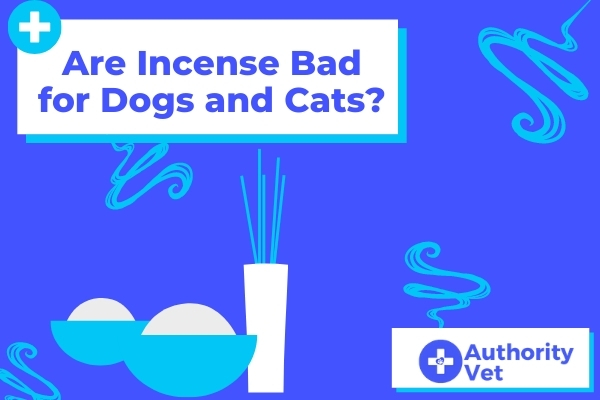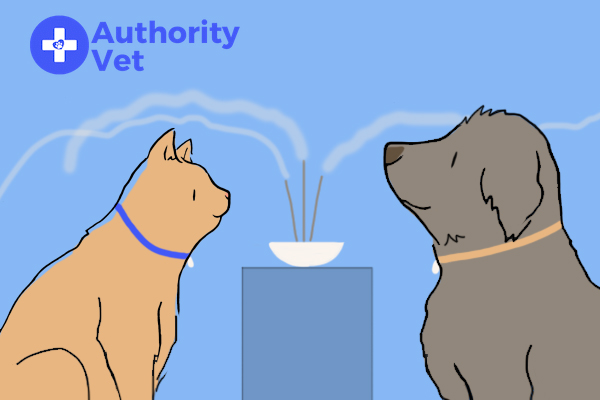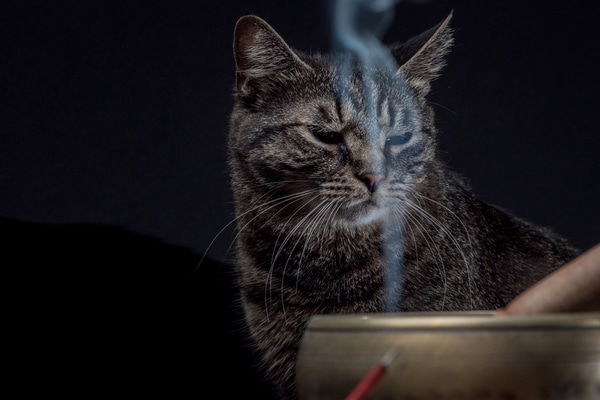With so many ways to make our homes smell wonderful, it's no surprise that incents, essential oils, and oil diffusers have become a popular choice among pet owners. Incents cover up a variety of odors, including pet smells. But, are they safe?
Because all incense emits smoke, there is no genuinely safe incense for dogs and cats. While many pet companies advertise pet-friendly incense, they contain scents that your pet may appreciate, such as peanut butter, but still, retain the same harmful ingredients as the rest.
Dogs and cats are susceptible to respiratory issues such as asthma and other forms of breathing issues, and the use of incense can exasperate these conditions. If your pet already suffers from a respiratory illness, it may be best to avoid incense. Consult with your veterinarian before diffusing incense throughout your home.
If your dog or cat has no known breathing problems, it may be acceptable to use incents in your home. Just ensure they are kept out of reach of your pet. With this in mind, it may be beneficial to diffuse an incense in an area where your pet does not have access. If this is not feasible, ensure proper ventilation is achieved by opening a window or using an air purifier.

Essential oils and incense can especially be toxic to cats. As stated previously, they can cause significant irritation to their respiratory tract when inhaled. In cats specifically, incense can cause severe systemic diseases such as liver failure as cats do not have the appropriate enzymes to breakdown the chemicals in certain essential oils. It is best for cats to avoid the use of essential oils as they can be toxic if ingested or absorbed by their skin. Cats do not need to come into direct contact with the oils as they can be absorbed through the air that comes in contact with their skin. This is important to remember as cats are obsessive groomers and can quickly ingest incense droplets as they accumulate on their skin and fur.
Dogs are also sensitive to incense, just like cats. Dogs with pre-existing conditions such as brachycephalic breeds (short-faced dogs) are at a high risk for incense sensitivity. If you choose to burn incense, keep a close eye on your dog to ensure they do not exhibit any adverse symptoms.
While incense smell great, they can emit harmful chemicals while being burned, such as:
When burned, incense produces the above volatile organic compounds harmful to both people and their pets.

The following types of incenses should be avoided for both cats and dogs:

If you believe your pet has come in contact with an incense, contact your veterinarian right away. Your Vet may recommend bathing your pet to remove the toxic substances on their skin and fur. This will help to prevent further absorption of the toxin.

Nicole is a Licensed and Registered Veterinary Technician in Washington and California. She is the immediate past president of the Washington State Association of Veterinary Technicians and holds multiple advanced degrees in veterinary technology, psychology, and human health care management. She has worked in private and corporate settings. Nicole manages an ambulatory surgery practice based in the Puget Sound area of Washington. When not working in the clinic, Nicole is a frequent lecturer at various national and international conferences and meetings. She is also a tireless advocate for the appropriate use of regenerative therapies in veterinary medicine.
